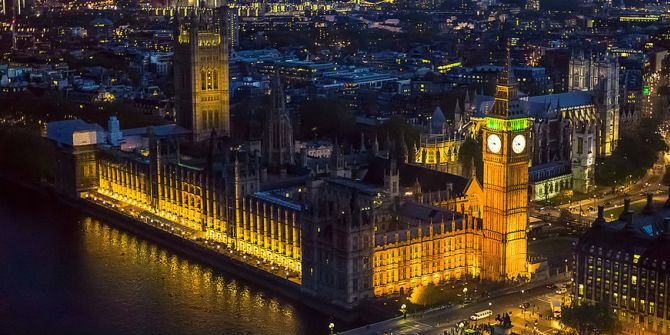With Britain simultaneously becoming less religious and more religiously diverse, can the continued existence of faith schools be justified? Stephen Evans challenges the continued privilege afforded to faith groups in the education sector, and suggests that only a fully secular education system can truly promote tolerance and inclusivity.

A new global survey has revealed that religion is a major source of tension and division in British society. With this in mind, it should be a matter of worry that in Britain today much of our school system is delineated along religious lines – facilitating the cultural isolation of children.
The Government funds many different types of ‘faith school’. Currently, around one third of state-funded schools in England and Wales have a faith designation. Education in Northern Ireland is highly religiously segregated and denominational schools still divide children in Scotland.
If we were to design a state education system from scratch today, arranging it around religious identities would be unthinkable. But thanks to an archaic ‘settlement’ between church and state in 1944, today’s educational landscape is very much organised along outdated lines of faith.
Thankfully, a new national campaign has been set up to challenge this status quo. No More Faith Schools, set up by the National Secular Society, is dedicated to bringing about an end to state-funded faith schools of all types. The vision is for children from all faith and belief backgrounds to be educated together and allowed to develop their own beliefs independently, free from undue religious influence.
The blurring of the distinction between education and religious inculcation in Britain is largely the legacy of the churches’ historical role and influence in education. The continued involvement of organised religion in modern Britain is simply untenable. Seventy per cent of 16- to 29-year-olds in the UK say they have no religion. Meanwhile, the share of the population which is religious is also increasingly fractured into minority faiths.
The implications of this change will need to be considered – and nowhere more so than in our state education system. Our schools have a vital role to play in building social cohesion and ensuring that pupils mix with children of other backgrounds. Schools are the obvious places to build bridges between people of all faiths and none. It is therefore short-sighted and reckless to continue to arrange the education of Britain’s children around the religious identities of their parents.
In a tolerant society, religious groups deserve equal but not special treatment. Yet religious exceptionalism is the very essence of faith schools. Many schools with a religious character have Equality Act exceptions which allow them to discriminate because of religion or belief in relation to admissions. They can also apply a religious test when appointing teachers. They have their own faith-based inspection regime to evaluate the distinctiveness and effectiveness of a school as a ‘religious institution’. Whilst the law prohibits teachers from promoting partisan political views, the promotion of partisan religious views is somehow seen as legitimate – and even desirable. This needs to be challenged.
Giving faith groups – sometimes with questionable views – access to money, influence and power to run our schools distorts young people’s education and undermines their religious freedom. It also undermines parental freedoms. Faith schools are often justified in terms of ‘parental choice’. However, the presence of church schools and a lack of secular provision often leaves parents with little or no choice but to send their child to a school with a religious ethos. And sometimes even needing to feign religiosity and attend church to access this public service. This is a ridiculous and shameful state of affairs in 21st century Britain.
Yet despite widespread public opposition to the funding of faith-based schools, far too many of our elected representatives seen unwilling to upset influential faith community interests and speak out against them. No More Faith Schools provides a platform for everyone who wants an inclusive and secular education system to show their support for that – and at the same time challenge the many myths perpetuated by vested interests to justify the continued existence of faith schools.
And let’s be clear. There’s nothing discriminatory or ‘anti-religious’ about advocating for a secular model of education. Parents have the right to raise their children in a faith tradition, but there is no obligation on the state to fund that. Schools are the golden opportunity to bring communities together and promote tolerance and inclusivity. That opportunity is being squandered thanks to the proliferation of faith schools.
Sweden’s senior governing party, the Social Democrats, has recognised this and pledged to abolish faith schools if re-elected at the general election in September. “For us it’s clear that no student should be subjected to religious influence in school,” said Swedish schools minister Anna Ekström. “To have faith or not should be every child’s own choice.” Dismantling the faith school system in Britain may be a greater challenge, but British politicians should follow Sweden’s principled lead and recognise that it is both possible and desirable to stand up for inclusive secular schooling.
A secular education system would be welcoming of all children, no matter what their parents’ religious views are. The success and popularity of community, non-denominational and integrated schools up and down the country is testimony to this. The many teachers motivated by their faith to educate and inspire young people should be welcome to do so in publicly-funded schools, but they must not be permitted to use their position to push their religious beliefs on pupils. Religion should still be studied in schools, but objectively and as part of a broad and balanced curriculum that in no way seeks to inculcate children into a faith.
Religious groups should no longer call the shots when it comes to educating the nation’s children. Education policy and practice must focus more on children’s independent interests and building a shared society rather than pandering to religious groups at least in part motivated by their need for self-preservation.
No one should be discriminated against, marginalised or segregated on the basis of faith in modern Britain. Faith schools have a negative impact on social cohesion, foster segregation of children on social, ethnic and religious lines, and undermine choice and equality. They also enable religious groups to use public money to evangelise children. Tackling only the most egregious aspects of them isn’t enough. The whole concept of faith schools needs to be challenged. No More Faith Schools does just that.
About the author
 Stephen Evans is chief executive officer of the National Secular Society and a regular media commentator on the place of religion in British public life.
Stephen Evans is chief executive officer of the National Secular Society and a regular media commentator on the place of religion in British public life.
Note: This piece gives the views of the author, and not the position of the LSE Religion and Global Society blog, nor of the London School of Economics.






An entirely rational essay on the state of England’s school system. In Wales we have the good fortune that the Anglican church is disestablished. There are faith schools but they are fewer in proportion to secular schools than is the case in England. The small rural Primary Schools which are church schools are closing for purely economic reasons and the new build is of 6 to 19 “super schools” . A former Education Minister commented a decade or so ago “church schools will wither on the vine”.
The article is nothing more than a series of moral assertions with zero justification. I don’t know what the scientific evidence is on whether withdrawing state funding from faith schools would help children achieve better outcomes, but it doesn’t look as if Stephen Evans knows either.
I will make one unjustified moral assertion of my own: that major reformations of the education system should only be made as a result of objective (so far as is possible) evaluations by a wide range of independent education experts who have studied the evidence. No, it’ll never catch on…
Rather disappointing that now, in 2019, none of the main parties are in favour of secular schooling. Even Labour have said they will protect faith schools. Yet most young people have no religion. I cannot see a justification in separating kids according to their parents’ religion. We’ve seen the damage it can cause in Ireland and, to a lesser extent, Scotland. What is so hard to imagine about a schools system which merely teaches ABOUT religion rather than preaching it?